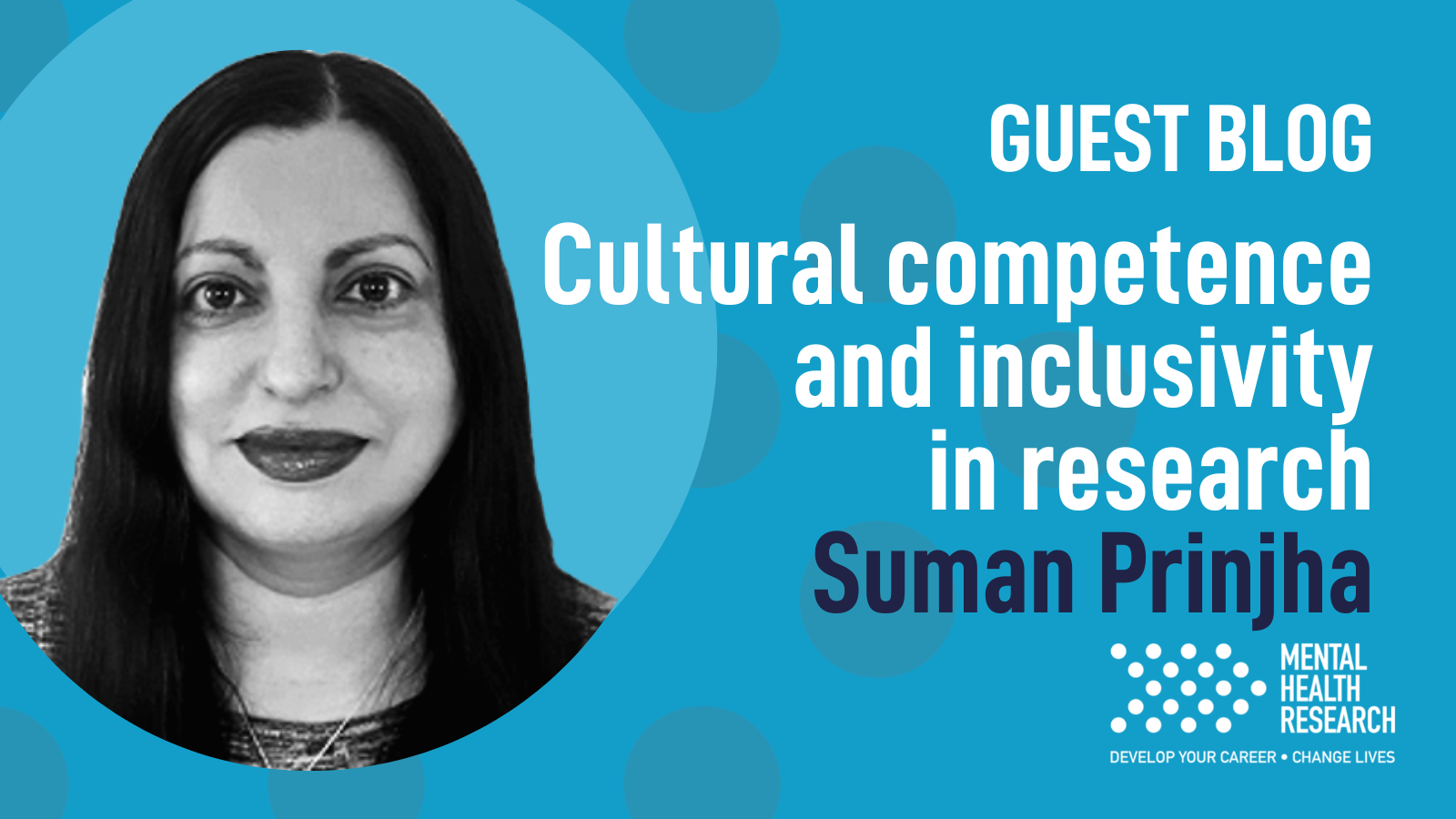
This article was originally published 1 December 2022 on the NIHR Research Design Service blog.
The inclusion of people from diverse ethnic and cultural backgrounds in health and care research is essential to conducting relevant, impactful research. Cultural inclusivity needs to be considered at every phase of the research process and therefore at all stages of a grant application, from design to dissemination.
What is cultural competence?
‘Cultural competence’ is an ongoing process of developing self-awareness, cultural knowledge (including knowledge about health beliefs and practices across cultures), and skills that will help us build relationships with people of various cultural backgrounds. It’s a continuous process of reflection and self-evaluation: a process that helps us become more aware of our own culture or intersecting cultures, and more aware of the assumptions, subconscious stereotypes, bias or judgements that we may have about our own or other communities which could impact our research.
Cultural competence is a continuous process
Cultural competence is about empathy, sensitivity, and recognising power dynamics. It requires humility, and recognising that the cultural groups that researchers work with are the experts in their own lives. Cultural competence is an evolving process because cultures themselves are always changing.
The concept of ‘cultural competence’ has been the subject of some debate over the years, with researchers questioning whether anyone can ever be ‘competent’ in cultures other than their own. The word ‘competence’ implies a certain level of expertise or proficiency. While no one can ever be completely culturally competent, the ongoing process of reflection and self-awareness is vital to engaging better with diverse ethnic and cultural communities.
Cultural inclusivity from design to dissemination
Cultural beliefs influence people’s views and experiences of health, illness, healthcare, services and support. Culture can also shape people’s views about taking part in research. When thinking about our research topic, it can be helpful to consider how we will include a diverse range of views in our study and ensure that the study design doesn’t exclude specific groups. Some topics may be considered taboo in some communities or there may be stigma around talking about them. Having a diverse research team, patient and public involvement group, advisory or steering group, can help us learn from a wide range of views and perspectives and make our research more inclusive.
Build relationships with community and voluntary organisations as early as possible
It’s also important to consider whether our study materials (such as participant information sheets and consent forms) are developed with cultural inclusivity in mind. Any materials that we plan to share with participants need to be easy to read and understand or they could create a barrier to taking part in the study. It can also be helpful to consider whether having study materials in more than one language, or in audio and video formats, would help us recruit people who don’t speak English or participants who feel more comfortable speaking in another language. Translation and interpretation may also need to be factored into the study costs.
Recruiting a diverse sample is crucial to conducting inclusive research. It’s helpful to build relationships with community and voluntary organisations, community leaders, faith groups, support groups and charities as early as possible. Trust, respect and confidentiality are key.
Data collection needs to include the views and experiences of people from a wide range of backgrounds
During the data collection phase, we need to ensure that the views and experiences of people from a wide range of backgrounds are included. It might be helpful to have researchers with specific language and cultural skills who can help with collecting data, analysis and interpretation. In some cultural contexts, the gender of researchers will need to be considered and whether, for example, we need to have single-sex groups. When conducting focus groups, interviews, workshops or other events, it’s also helpful to consider whether these are being held on dates, or at times, that might clash with cultural or religious activities that are important to our participants.
We need to ensure that our study findings reach diverse audiences… sharing our findings in community settings
When it comes to dissemination, we need to ensure that our study findings reach diverse audiences, including people from a range of cultural and ethnic groups. As well as peer-reviewed papers and conference presentations, sharing our findings with community organisations, faith centres, and community TV and radio stations can help us reach people who may access information mainly in community settings.
Training and support
Cultural competence is a continuous process and attending courses can help increase knowledge and awareness. The NIHR Research Design Service can also help support researchers to consider cultural inclusivity at every stage of the process. If you’d like support, do contact your regional RDS as early as possible.
Useful links and resources
The Centre for Ethnic Health Research: Cultural Competence training course
Open access research paper in BMC Medical Research Methodology: Prinjha, Miah, Ali, & Farmer (2020) Including ‘seldom heard’ views in research: opportunities, challenges and recommendations from focus groups with British South Asian people with type 2 diabetes
NIHR Research Design Service: Community engagement toolkit
NIHR Applied Research Collaboration East Midlands: Increasing participation of Black, Asian. and minority ethnic groups in health and social care research toolkit
The Three NIHR Research Schools Mental Health Programme will host Dr Suman Prinjha at a free webinar on cultural competence and inclusivity in research on Tuesday 4 April 2023. Reserve your place on Eventbrite.
The NIHR Schools for Primary Care Research (SPCR), Public Health Research (SPHR) and Social Care Research (SSCR) (“Three Schools”) have joined together in a unique collaboration between leading academic centres in England to collaborate on a programme of work on mental health, led by the SPCR and funded through the National Institute for Health and Care Research (NIHR).
For further information about the Three NIHR Research Schools Mental Health Programme, please visit the Programme website or contact Claire Ashmore, Community Engagement Manager: c.ashmore@keele.ac.uk
